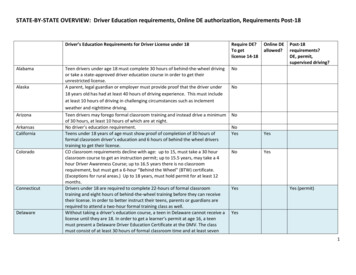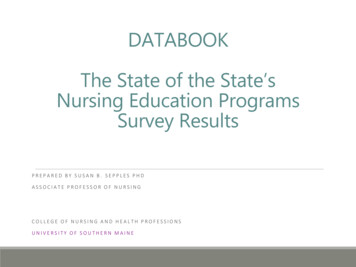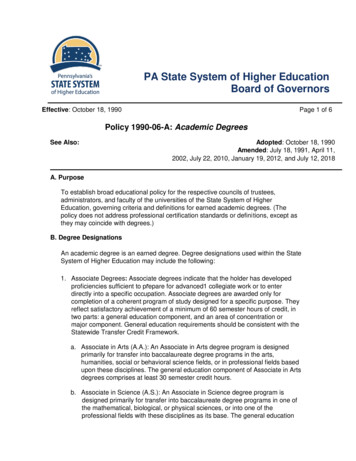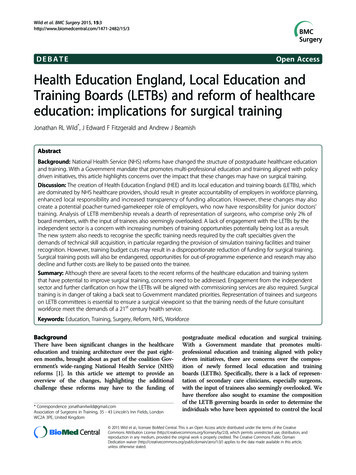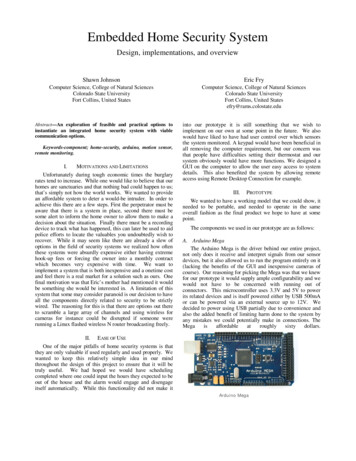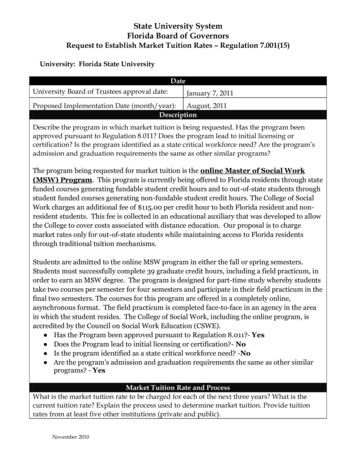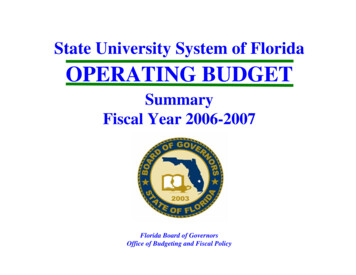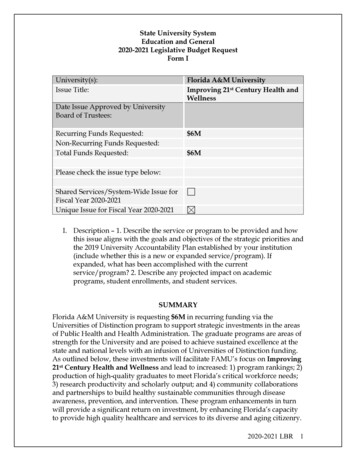
Transcription
State University SystemEducation and General2020-2021 Legislative Budget RequestForm IUniversity(s):Issue Title:Florida A&M UniversityImproving 21st Century Health andWellnessDate Issue Approved by UniversityBoard of Trustees:Recurring Funds Requested:Non-Recurring Funds Requested:Total Funds Requested: 6M 6MPlease check the issue type below:Shared Services/System-Wide Issue forFiscal Year 2020-2021Unique Issue for Fiscal Year 2020-2021I. Description – 1. Describe the service or program to be provided and howthis issue aligns with the goals and objectives of the strategic priorities andthe 2019 University Accountability Plan established by your institution(include whether this is a new or expanded service/program). Ifexpanded, what has been accomplished with the currentservice/program? 2. Describe any projected impact on academicprograms, student enrollments, and student services.SUMMARYFlorida A&M University is requesting 6M in recurring funding via theUniversities of Distinction program to support strategic investments in the areasof Public Health and Health Administration. The graduate programs are areas ofstrength for the University and are poised to achieve sustained excellence at thestate and national levels with an infusion of Universities of Distinction funding.As outlined below, these investments will facilitate FAMU’s focus on Improving21st Century Health and Wellness and lead to increased: 1) program rankings; 2)production of high-quality graduates to meet Florida’s critical workforce needs;3) research productivity and scholarly output; and 4) community collaborationsand partnerships to build healthy sustainable communities through diseaseawareness, prevention, and intervention. These program enhancements in turnwill provide a significant return on investment, by enhancing Florida’s capacityto provide high quality healthcare and services to its diverse and aging citizenry.2020-2021 LBR1
Section I:FAMU’s Universities of Distinction Project Framework and RationaleThe modern healthcare system has become one in which interdisciplinary teamsrepresent complex entities who are increasingly asked to innovate, lead change,maximize work quality and efficiency to address challenges to public health, thehealthcare service arena, and the health profession. To help address thesechallenges, Florida A&M University (FAMU) has identified a unique area ofstrength where it will focus on Improving 21st Century Health and Wellness byleveraging its high-level graduate programs in Public Health and HealthAdministration as a University of Distinction. Three specific academic programshave been identified that will work synergistically towards Improving 21stCentury Health and Wellness in the State of Florida.1. Doctor of Public Health (DrPH)2. Master of Public Health (MPH)3. Master of Health Administration (MHA)FAMU’s approach to Improving 21st Century Health and Wellness is guided bythe goals and priorities outlined in FAMU’s 2019 Accountability Plan and 20172022 Strategic Plan (FAMU Rising), which are aligned with the State UniversitySystem’s Strategic Plan. Outcomes from this initiative will result in theproduction of a more highly qualified workforce to meet the demands of today’spublic sector and healthcare industry. Specific to the State of Florida, foci of theinitiative will be geared towards: Enhancing methods of disease prevention, health promotion, awareness,intervention, and community-participatory research (Public Health);Increasing efficiency and effectiveness in the management of healthservices (Health Administration); andDeveloping enhanced inter-professional collaboration and traininginitiatives with integrated practical and simulated experiences designed toimprove overall health outcomes in the 21st century (Integration of PublicHealth and Health Administration)Inter-professional collaborations allow public health professionals and healthcaremanagers to engage in protecting and improving the health of people and thecommunities in which they live; promoting healthy lifestyles, researching diseaseand injury prevention; and detecting, preventing and responding to criticalhealth issues. Essential components to inter-professional collaboration includeeducational training that incorporates practical experiences for faculty andstudents, either through authentic on-site encounters in a face-to-faceenvironment or through multi-disciplinary simulations that enhance skillproficiency and promote teamwork in the delivery of health care. Through thisinitiative, FAMU will increase opportunities for students to be actively immersedand engaged as developing professionals groomed in a multifunctional andinterdisciplinary environment that exemplifies the scholarship of teaching andlearning, allowing faculty and students from both public health and healthadministration to engage in learning and evaluation simultaneously.2020-2021 LBR2
Table 1 – Alignment of Proposal with Key Goals of Universities of DistinctionKey Goals of Universities ofDistinctionAlignment of FAMU’s Proposal for Improving21st Century Health and WellnessFocuses on a core competencyunique to the State UniversitySystem and one that achievesexcellence at the national or statelevel Meet state workforce needs nowand into the future, includingneeds that may further diversifyFlorida’s economy Addresses critical workforce needs in thehealthcare industryo Servicing Florida’s agingpopulationo Servicing underserved populationso Producing highly trainedworkforceFosters an innovation economythat focuses on areas such ashealth, security and STEM Contributes to diversification of Florida’sHealth economy via production of highlytrained graduates equipped to addressemerging need to offer healthcare servicesin both institutional and non-hospitalhomecare settings. Focuses on Health programs (corecompetency for SUS and FAMU)Targets goals to achieve excellence at stateand national levels via rankings andrecognitions for program quality,diversity, and affordabilitySection II:Overview of FAMU’s Public Health ProgramsThe field of Public Health focuses on improving and protecting communityhealth and well-being, with an emphasis on prevention among large groups ofpeople. Significant progress has been made in the past century in improvinghealth and longevity through public health interventions and advances towardshigh-quality healthcare. However, fundamental challenges still exist as keyfactors that significantly influence overall health and well-being for manymembers of society; particularly outcomes related to racial and ethnic disparities.(Public Health 3.0: A Call to Action for Public Health to Meet the Challenges ofthe 21st Century, 2019)Fortunately, many programs, such as FAMU’s DrPH and MPH are working toinfluence these determinants both by producing more graduates (especiallyminorities) trained to effect change and bring added value in disciplines thataddress workforce shortages. FAMU’s public health professionals are uniquelyqualified to conduct research and build collaborative partnerships with localcommunities that focus on effective methods for increasing awareness andimplementation of primary prevention and disease intervention measures.2020-2021 LBR3
Leveraging the competencies of FAMU’s Public Health programs increasesopportunities to more directly impact healthcare by integrating the three distinctareas of prevention as provided in the Center for Disease Control andPreventions’ framework Public Health 3.0. The CDC developed this frameworkin response to a transforming system of healthcare that typically focused onepisodic, non-integrated care towards one that integrates healthcare and publichealth to effect substantial change in lasting health for individuals, communities,and populations. The integration is conceptualized using three “buckets” ofprevention – traditional clinical prevention interventions, interventions, andextend care outside the care setting, and total population or community-wideinterventions. (Healthy People 2020, U.S. Department of Health and HumanServices)FAMU’s public health programs work in concert with this model as graduatesare trained to develop non-clinical, community approaches using evidence-basedresearch to help build sustainable, healthy communities outside of the clinicalsetting and that affect total populations.Figure 1 – Center for Disease Control Public Health FrameworkSource: ic-health-meet-challenges-21st-century/A. Public Health (DrPh, MPH) Program ProfileThe FAMU Institute of Public Health (IPH) was founded in 1995 and is housedwithin the College of Pharmacy and Pharmaceutical Sciences & Institute of PublicHealth. IPH was established to address disproportionately affected populations,experiencing adverse health outcomes such as heart disease, stroke, cancer,diabetes, infant mortality, HIV/AIDS and environmentally related conditions. Itsmission is to develop and produce culturally competent public health practitionersand leaders through graduate training, research and service. Focus areas of the2020-2021 LBR4
program are: (1) Disease Intervention, Prevention and Awareness; and (2)Community-Based Participatory Research (CBPR).The FAMU Public Health programs, through the expertise of its faculty, havecollectively over 236 years of experience in teaching, research, and service and arecontinuously contributing substantially to the state of health in Florida throughlocal and state-wide community partnerships. The program is the first DrPHdegree program to be offered by a Florida institution of higher learning. Since itsfounding, the program has grown. and distinguished itself as one of FAMU’ssignature and most impactful health programs. Since the graduation of the firstDrPh student in 2008, 39 students have been conferred with the DrPh. The MPHprogram has graduated 364 students since 2004. Since its inception, the FAMU IPHhas garnered over 15 million in total extramural funds (includes committed fundsfor outlying years) through the success of the faculty in obtaining federal and statecontracts and grants.B. Strengths of FAMU’s Master of Science in Public Health (MPH) and Doctorof Public Health (DrPH) ProgramsFAMU’s academic programs in the Institute of Public Health (IPH) are highlyproductive and successful and are major strengths for the University. As notedbelow, these programs play a critical role in helping the University fulfill itsmission, which includes a dedication to the “empowerment of citizens andcommunities.” IPH supports FAMU’s long-standing focus and commitment toconducting research and producing graduates to address healthdisparities and issues that disproportionally impact minority populations.IPH aligns with the Strategic Priorities of the State University System toincrease the production of highly qualified graduates in STEM and healthdisciplines to meet Florida’s workforce needs.More than 90% of IPH graduates are African American, whichdemonstrates the ability of the programs to address diversity needs in theworkforce and produce graduates who are committed to providing healthservices to underserved populations.C. Program-Specific RankingsFAMU’s master’s level program in Public Health is currently ranked withinFlorida and nationally, and program faculty are striving to reach a designation ofexcellence in this program by increasing its existing rankings. Master of Public Health recognized by MPH Online as one of the bestMPH Programs in Florida for 2019 s-florida/)MPH ranked in the top 30 nationally for most affordable online MPHprograms in 2018 ine/mph-degreeprograms/)2020-2021 LBR5
IPH ranked 113th nationally (tie with FSU) in the 2019 U.S. News Rankingsof “Best Public Health Schools.” This ranking placed IPH above two otherSUS institutions (UNF and UWF), and below three others (USF, UF, andFIU).Universities of Distinction funding will assist in elevating FAMU’s Public Healthprograms to excellence at the state and national levels, as reflected below: Become a top 75 program nationallyBecome a top 3 program in FloridaBecome a top 20 program nationally for affordabilityUniversities of Distinction funding will also enhance FAMU’s ability to increasecommunity partnerships that target disease prevention and awareness.Specifically, the programs in Public Health are seeking to contribute to theoverall health and wellness in the State of Florida through: Expanding current initiatives of conducting community-wide assessmentsin Leon and Gadsden counties to determine gaps in community publichealth needs (Year One);Increased collaborations with agencies to address the problem ofchildhood obesity (Year One);Expanding partnerships with counties in Florida to addressenvironmental health concerns (Year One); andIncreased collaborations to provide disaster management and emergencypreparedness outreach (Improvement Over Time).D. Workforce Demand for Public Health ProfessionalsJob outlook for public health professionals overall is growing nationally and inthe State of Florida, particularly as governments and health agencies try toreduce cost and favor practices that focus more on preventive care and teachingcommunities how to sustain good health. Bureau of Labor Statistics (2018) datareports that employment for health educators and community workers isprojected to grow by 11% between 2018 and 2028, much faster than the averagefor all occupations.2020-2021 LBR6
Figure 2 - BLS Data - Health Educators and Community WorkersThe job outlook for Public Health professionals in the State of Florida is alsoimpressive. Information from O*NET shows data for some of the topoccupations in public health with a bright outlook. A review of the top fiveoccupations, which are listed below, reveals that the projected growth for theState of Florida ranges from an average of 5% to 15% from 2016-2026.1.2.3.4.5.Occupational Health and Safety SpecialistsHealth EducatorsMedical and Health Services ManagersCommunity Health WorkersHealth Specialties, Teachers, PostsecondarySource: https://www.onetonline.org/find/quick?s public healthBLS data (2018) also shows Florida ranked as one of the top five states with thehighest employment level of health educators and community health workers.2020-2021 LBR7
Table 2 – Employment of Health Educators, by state, May 2018 (BLS)STATEEMPLOYMENTEMPLOYMENTPER THOUSANDJOBSHOURLY ANNUALMEANMEANWAGEWAGECALIFORNIANEW YORK7,8304,6400.460.49 31.25 27.41 65,000 57,010FLORIDA3,5590.41 26.21 54,520GEORGIATEXAS2,6502,4700.600.20 41.08 26.24 85,440 54,580Source: ble 3 - Employment of community health workers, by state, May 2018 (BLS)STATEEMPLOYMENTEMPLOYMENTPER THOUSANDJOBSHOURLYMEANWAGEANNUALMEANWAGENEW YORK6,5900.70 21.32 44,340CALIFORNIA6,1600.36 23.68 49,260MASSACHUSETTS3,6601.03 21.39 44,500FLORIDA2,8800.33 19.20 39,930TEXAS2,8200.23 20.02 41,640Source: cause of the versality in the public health sector, MPH and DrPH graduatescan work in a variety of fields within public health with median salary rangesfrom 33,000 - 162,000 annually.Table 4 – Median Salaries of Public Health Occupations (BLS)OCCUPATIONMEDIANSALARY% GROWTH BY2022EPIDEMIOLOGIST 74,12010.2%COMMUNITY HEALTH WORKERS 38,18025.1%ENVIRONMENTAL SCIENTISTS ANDSPECIALISTS 72,05014.6%HEALTH EDUCATORS 55,26019%HEALTHCARE SOCIAL WORKERS 53,59026.8%Source: ublic-health-jobs2020-2021 LBR8
FAMU’s graduate programs in Public Health train graduates for each of theabove occupations. Specifically, the MPH and DrPH have areas of specialties aslisted below. Behavioral Science (MPH, DrPH)Health Education (MPH, DrPH)Epidemiology and Biostatistics (MPH, DrPH)Environmental Occupational Health (MPH)Health Policy Management (MPH)Salaries for FAMU graduates of Public Health fall near or within the range ofoccupational salaries shown above and the mean range ( 39,930 - 54,520) forcommunity and health workers in the State of Florida for 2018. Graduates withdoctoral degrees are employed at higher rates. Data from the Florida Educationand Training Placement Information Program (FETPIP) reports salaries onFAMU graduates employed in the State shows the following.Table 5 - FAMU MPH and DrPH Graduates' Salaries (State of Florida)2014-152015-162016-17MPH 37,432 43,800 39,388DRPH 68,488 69,716 55,628Source: FETPIP, 2014-2017, tmlSection III:Overview of FAMU’s Health Administration (MHA) ProgramA. Master’s in Health Administration (MHA) Program ProfileThe Master of Science in Health Administration (MHA) degree program wasestablished at FAMU in 2000 with the first class in 2001. The program is designedto provide the necessary skills for those seeking leadership management careersin a variety of public, private nonprofit, and for-profit health care organizations,including, but not limited to, hospitals, long-term care organizations, integrateddelivery systems, insurance firms, medical group practice, ambulatory careorganizations, mental health agencies, public health, managed care, and healthcare consulting. The program seeks to improve the quality of health services byproviding a competency-based, comprehensive graduate education in healthadministration through excellence in teaching, research, and service to thecommunity.FAMU MHA faculty have over 95 years of collective experience in teaching,2020-2021 LBR9
research, and service, which adds depth and breadth to the quality of training forour graduates. The program has graduated 148 students since inception.B. Strengths of FAMU’s Master’s in Health Administration (MHA) ProgramsChanges in a diverse nation and growing economy are having a direct impact onthe healthcare industry. With these changes come a number of challenges. Asmore individuals become qualified to lead in the healthcare field, a greaterimpact can be made to address the challenges of the 21st century. By the year2030, the number of people over 60 years of age will increase by 56 percent. Toaccommodate this drastic change, organizations will need to continuouslyupdate their practices and have qualified health care leaders to manageoperations and services. FAMU’s Master’s in Health Administration contributesto meeting this growing demand by producing qualified graduates each yeartrained in health management and services. The MHA program also helps todiversify Florida’s economy for health management and services occupation.Data from the U.S. Department of Health and Human Services (2018) shows thatonly 12% of managers in medical and health services in 2018 were Black/AfricanAmerican.Table 6 - Medical and Health Services Managers by Race, 2018 (BLS)White80.9%Black or AfricanAmerican11.5%Asian5.0%Hispanic orLatino9.0%Source: https://www.bls.gov/cps/cpsaat11.htmThrough this initiative, FAMU will also help to address a specific need as itrelates to the management of nonprofit long-term care facilities, which will be indire need as the U.S. and Florida work to resolve healthcare challenges stemmingfrom the baby boomers’ era. As part of its current offerings, the MHA programwill enhance opportunities for enrolled students by providing uniqueexperiences tailored to nonprofit healthcare facilities through the establishmentof an Executive Residency Program for Nonprofit Organizations. A review ofpeer institutions with MHA programs reveals that none currently offer anExecutive Residency Program specific to nonprofits.Further evidence towards FAMU’s distinct capacity for the design and deliveryof relevant disease awareness, prevention and communication strategies areshown through the faculty’s established record of excellence as it relates toresearch and collabora
The FAMU Public Health programs, through the expertise of its faculty, have collectively over 236 years of experience in teaching, research, and service and are continuously contributing substantially to the state of health in Florida through loca
